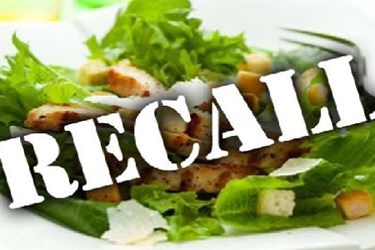Chicken Caesar Salad Kits Recalled From Sam's Clubs Nationwide
By Laurel Maloy, contributing writer, Food Online

A Southern California food processing company, APPA Fine Foods, based in Corona, CA, has issued a recall for almost 93,000 pounds of salad due to possible Listeria monocytogenes contamination
Considered a Class I recall, the infection was discovered by the Michigan Department of Agriculture and Rural Development on Aug 26. Personnel from that agency received two positive Listeria monocytogenes (Lm) results from retail packages purchased at a single Sam’s Club location. Following the discovery, Sam’s Club sampled intact components of the salad kits, confirming positive Lm results for the chicken in the salad kits.
The chicken Caesar salad kits were manufactured between Jul 4 and Aug 8, with Use By dates of: 8/14/14, 8/21/14, 8/27/14, 9/1/14, 9/3/14, and 9/17/14. Sold in 11-ounce clear plastic containers and in 6.5-pound boxes the label reads, “APPA Fine Foods/Sam’s Club Daily Chef CHICKEN CAESAR SALAD KIT. The affected case codes are: 141851, 141922, 141951, 141991, 142021, 142201 and 142131 with the establishment number “P-21030” inside the USDA mark of inspection.
Learn more about aerobic bacterial screening systems
Listeria is most often acquired through the ingestion of food contaminated with Listeria monocytogenes. The pathogen is commonly found in soil and water and can be carried by apparently healthy animals, contaminating animals that are food sources, such as cows and chickens. The most troublesome fact, however, is that Lm can live in food processing facilities for years, regularly contaminating products over an extended period of time. Frequent testing and environmental monitoring is the only way to ensure a Listeria-free environment.
Technology over the last decade has improved to provide on-site, easy-to-use testing products. Called Environmental Listeria Plates (EL Plates), the test makes it possible to analyze environmental samples quickly, within 27 to 31 hours. These tests do not require an enrichment step, a labor intensive and time-consuming action, where errors are most likely to occur. EL Plates are a viable solution to more closely and efficiently monitor facility sanitation; they are able to detect both injured and uninjured Listeria on a plant’s environmental surfaces. The significance here is that it has been scientifically proven that both heat-injured and freeze-injured listeria can be resuscitated. In the right conditions, injured Listeria germs can essentially “rise from the dead” to infect again.
Same-Day Food Bacteria Detection
Listeria, unlike many other pathogens, will thrive under refrigeration. It’s prolific, it’s microscopic and hard to detect. It’s even harder to kill; until recently, the only sure-fire way to kill the pathogen was thought to be with cooking or pasteurization. However, that process is also being questioned and explored. The cooked chicken in this most recent recall is an example of a listeria infection that should not have occurred. The only way to avoid Listeria contamination, and the associated headlines, is with due diligence and a commitment to prevention. Current Good Manufacturing Practices (CGMPs) and Hazard Analysis and Risk-Based Preventive Controls (HARPC) are the best preventive tools available.
